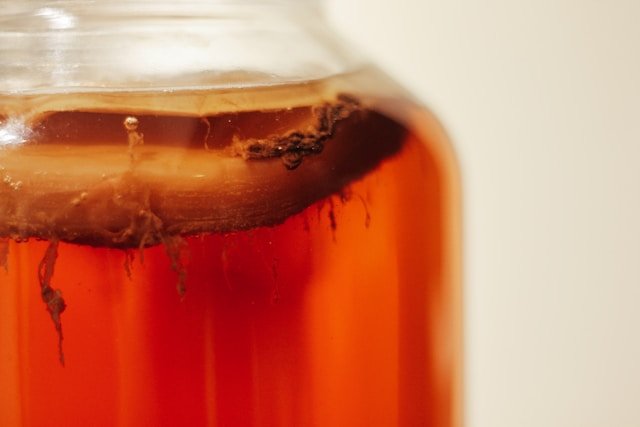
Kombucha is a centuries-old fermented tea beverage that has surged in popularity, enticing many with its unique tangy flavor and potential health benefits. Rooted in traditional medicine, this drink aligns seamlessly with today’s wellness culture, embodying a rich history of health practices. From its brewing methods to its numerous benefits, we delve into how kombucha integrates into modern lifestyles.
Tracing the Origins of Kombucha: A Historical Backdrop
To truly appreciate kombucha, understanding its historical context is essential. Its legacy spans continents and centuries, showcasing its timeless allure.
Ancient Beginnings in the East
Kombucha is believed to have originated in China during the Tsin Dynasty around 220 B.C., earning the title “tea of immortality.” This fermented concoction served as both a tonic and sustenance for early civilizations, eventually making its way through trade routes to Russia and Eastern Europe, each region adding its distinctive touch to the recipe.
Rediscovering Kombucha in the West
The early 20th century witnessed a resurgence of interest in kombucha in the Western world, spurred by scientists who conducted research on the drink. Today, kombucha is recognized as a functional beverage, merging the benefits of healing tonics with enjoyable flavors, appealing to the health-conscious consumer.
The Craft of Brewing Kombucha: A Fizzy Creation
The Craft of Brewing Kombucha: The process of brewing kombucha results in a uniquely flavored drink rich in health benefits. This art requires a harmonious blend of science and creativity.
Essential Ingredients and Equipment
- SCOBY: A live culture of bacteria and yeast that drives the fermentation process.
- Tea: Typically made from black or green tea, which provides essential tannins and nutrients.
- Sugar: This ingredient fuels the SCOBY, facilitating fermentation.
- Fermentation Vessel: Glass jars are ideal for maintaining cleanliness during fermentation.
Brewing Steps: Transforming Sweet Tea into Sparkling Delight
- Tea Preparation: Steeped tea is sweetened and cooled before adding the SCOBY.
- Primary Fermentation: In one week to ten days, the mixture ferments, developing a sour, wine-like flavor.
- Flavoring and Bottling: Post-fermentation, various fruits, herbs, or spices are added for flavor before bottling for carbonation—a process that allows for endless creativity.
This intricate process marries precision with artistic flair, offering countless opportunities for personalization.
Kombucha’s Nutritional Profile: A Powerhouse of Wellness
Kombucha’s appeal goes beyond its delightful taste; it also boasts a wealth of vitamins and minerals alongside beneficial compounds formed during fermentation.
Probiotics for Digestive Health
One of kombucha’s notable features is the presence of probiotics, long-chain polymers generated during fermentation that support digestion, enhance nutrient absorption, and bolster the immune system.
Vitamins and Antioxidants
This beverage contains B vitamins and antioxidants that combat free radicals, which can damage cells. Green tea-based kombucha, in particular, is a rich source of catechins, known for their potential anti-inflammatory effects.
Organic Acids and Detoxification
Acids like acetic and gluconic acids play crucial roles in liver detoxification and can contribute to metabolic health.
Kombucha in Contemporary Times: A Lifestyle Choice
The resurgence of kombucha in the 21st century highlights its adaptability to evolving consumer preferences. It has transcended being just a drink to symbolize a lifestyle.
Kombucha in Wellness Culture
From yoga studios to specialty cafes, kombucha has established itself as a mainstay in wellness-centered environments. Its natural ingredients and probiotic benefits appeal to health-minded individuals seeking alternatives to conventional beverages.
Culinary Uses
Innovative chefs and mixologists are increasingly incorporating kombucha into their creations—from tangy salad dressings to refreshing cocktails—elevating both sweet and savory dishes with its complex flavors.
Kombucha and Sustainability: A Responsible Choice
Another compelling reason to choose kombucha is its alignment with sustainable living. The brewing process has minimal environmental impact, especially for those who opt to make it at home.
Homemade Kombucha for Sustainability
Brewing kombucha at home not only saves money but also reduces packaging waste. A single SCOBY can be reused multiple times, lowering one’s environmental footprint.
Composting and Circular Benefits
Used tea leaves and SCOBYs can be composted, returning nutrients to the soil in a sustainable cycle.
Choosing the Best Kombucha: A Buyer’s Guide
With numerous brands available, selecting the right kombucha can be overwhelming. Here are some tips to guide your choices.
Key Considerations
- Ingredient Clarity: Choose organic ingredients without artificial additives.
- Flavor Profiles: Experiment with fruity, spiced, and various combinations to discover your preferred taste.
- Live Cultures: Opt for unpasteurized kombucha to reap the probiotic benefits.
Exploring Online Options
Online retailers often offer a broad selection of kombucha, making it easy to access diverse flavors and styles.
Incorporating Kombucha into Daily Life
Kombucha serves not only as a beverage but also as a versatile ingredient that enhances everyday living. Here are some ways to integrate it into your routine.
Morning Energizer
Start your day with a glass of kombucha for an energizing boost that supports digestion and revitalizes energy levels.
Hydration Pre- and Post-Workout
Kombucha is an excellent choice for hydration before or after workouts, thanks to its natural sugars and electrolytes.
Kombucha in Celebrations
Use kombucha as a classy alternative to alcohol or as a mixer in craft cocktails during social events. Combine it with fresh fruits, herbs, and sparkling water for a refreshing drink.
Kombucha Beyond Hype: Clarifying Common Misconceptions
Despite its popularity, several misconceptions surround kombucha regarding its safety and benefits. Addressing these clarifications can enhance your appreciation of this beverage.
Alcohol Content and Safety
The fermentation of kombucha yields trace amounts of alcohol, but it is generally safe for all ages. Commercial products adhere to regulations that keep alcohol levels below 0.5%.
Sugar Content
While sugar is necessary for fermentation, most is consumed by the SCOBY. Thus, kombucha typically contains less sugar than sodas and many fruit juices, resulting in a healthier option.
Conclusion
Kombucha is a delightful synthesis of tradition and modern wellness, offering a tasty and health-promoting drink. Its journey from ancient origins to contemporary trends captivates health enthusiasts and flavor seekers alike. Whether driven by the benefits of probiotics, the intrigue of home brewing, or the quest for diverse flavors, kombucha has something for everyone. Embark on your kombucha adventure today and explore the myriad flavors this sparkling drink offers. In a fast-paced world where trends come and go, kombucha remains a steadfast ally for those committed to living healthily and sustainably.








